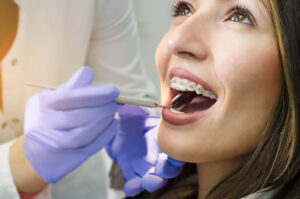How to Choose an Orthodontist
Finding a trusted medical professional can be a chore. Many turn to the recommendations and reviews of connections on social media to narrow the field. But what if you’re new to an area or your connections don’t have orthodontists they would recommend? Occasionally, a dentist will recommend a nearby orthodontist, but not always. From orthodontists themselves, here are some tips for choosing the right orthodontist for you.
Tip #1 – Orthodontics Training and Experience
You may be surprised to know that some states do not require an orthodontics specialization or test for licensure. Some believe a general dentistry license is sufficient. Ideally, your orthodontist is licensed and board certified. While orthodontists must be licensed to practice within a particular state, those requirements vary. Board certification shows a level of professionalism that indicates your orthodontist has gone through some specialized training and values lifelong learning.
In addition to the highest standards of training, it’s important to look at how long an orthodontist has been practicing. Not only is it important for the orthodontist to have experience, but it’s vital that the team around him/her is experienced and well-versed in the field as well. More years does not automatically mean one orthodontist is better than another, but when considered with other variables, like training, it can be a deciding factor.
Tip #2 – Location
Real estate isn’t the only industry where location matters. You want the most skilled orthodontist, but you don’t want to spend big portions of your life commuting to their office. The number of appointments you have with your orthodontist will not feel overwhelming if they don’t involve long, tedious drives in thick traffic. If you find a practice along your beaten path, you’re less likely to feel beaten down by the path. Think of how great it would be if you could find one close enough to your teenagers’ school that they can walk to appointments after school. (Obviously, that’s a nice-to-have rather than a must-have, but it’s worth keeping in mind.)
Tip #3 – Hours/Schedule
Check your potential orthodontist’s office schedule to confirm that it works with your work and school schedule. You don’t want to find yourself committed to treatment in one practice only to discover that you’ll have to take time off work for every appointment because the hours conflict. If you’re free during the workday, that’s one thing. If you’re paid by the hour, it’s something else entirely. Look for an orthodontics practice that has early morning hours or that stays open later some evenings. You might even be fortunate enough to find one that has a handful of weekend appointments available.
Tip #4 – The Office Fit
Your experience and orthodontics treatment doesn’t just rely on the orthodontist you choose. The staff surrounding that orthodontist plays a large role, too. Do they communicate clearly, promptly, and kindly? How long has the team worked together? High turnover among the staff indicates a culture that may not be ideal. It could also potentially impact the continuity and consistency of your care. Good team retention, on the other hand, indicates a positive work environment, consistent care, and valuable experience treating patients.
Tip #5 – Solo Orthodontics Practice or Orthodontics Associates?
Along the lines of continuity of care, consider your orthodontist’s role within the greater practice. If their name is on the practice, indicating ownership or partnership in some way, it’s likely they will be around for a good while. However, if they are working as an associate in somebody else’s practice, there is a greater likelihood that they could move during your treatment. It’s not an absolute indication, but it’s something to consider or ask about.
Tip #6 – Methods, Technology, Specialized Orthodontics Treatment Options
By now you’ve realized that not all orthodontists are the same. Nevertheless, there are even more technical nuances you may want to find out during your research phase. For example, did you know that there are different philosophies of orthodontics? Not only that, but there are new technologies being developed that an orthodontist may or may not have implemented in their practice. What are the reasons behind their decision? Last, but not least, will you need specialized treatment that is not universal to orthodontics practices, like adult treatment, jaw alignment, or displaced teeth? There are some specializations within the specialty you want to ask about.
The best way to discover accurate answers to these questions is to visit an orthodontist in person or schedule a virtual consultation during which you can ask more detailed questions about their clinical approach.
Tip #7 – Methods of Payment Available
Orthodontics is an investment in your smile, your bite, your speech, and your dental health. Whether you want it to or not, paying for that investment is a factor in your decision about an orthodontist. Find out if your insurance will cover braces. Find out if the orthodontist works in conjunction with other payment options or has a payment plan. Find out which treatment option best fits your budget.
Now that you’ve done the proper research, you can make an informed decision about your orthodontist. You will be able to ask educated questions and find the right practice for you.
visit the homepage for more latest articles









